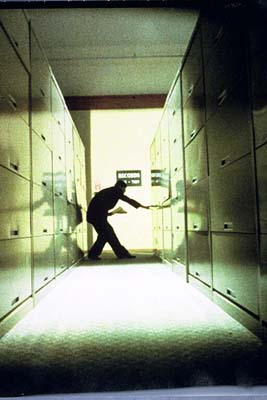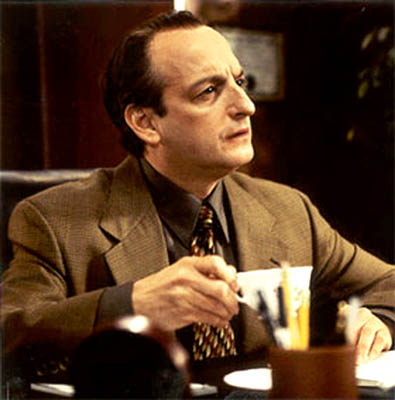

Way back in 1853, Herman Melville anonymously published Bartleby the Scrivener, the story of a worker who decides to stop working. What Melville could never guess was that his story, translated almost 150 years later to today's office environment, still makes plenty of sense. Jonathan Parker's adaptation is in the same vein as many of the workplace comedies that appear intermittently on screen. The main difference is that this is an adaptation of a short story. The movie itself is relatively short, but is still requires Parker to stretch the source material too far. Bartleby first mocks office culture, then descends into repetition and finally into nothingness. Parker moves the action (or inaction) to a public records department of a small office headed by the Boss (David Paymer, Focus, Bounce). The Boss just got a new contract from the city, so he needs to hire help. He brings on Bartleby (Crispin Glover, Charlie's Angels, Nurse Betty), an odd, taciturn man, to help with the new work.
Bartleby changes the dynamic of the office, which previous consisted of incompetent Ernie (Maury Chaykin, The Art of War, What's Cooking?), ladies man Rocky (Baby Bedlam, Open Season), and sultry secretary Vivian (Glenne Headly, Timecode, Breakfast of Champions). They spend their day working and goofing off. Ernie with his toys and Rocky with his chair. At first, Bartleby puts them to shame by working like a madman, then he stops. Every attempt by the Boss to get him to work yields the answer "I would prefer not to." Upwards of 90% of Glover's lines consist of that phrase, which embeds itself into the psyche of the Boss. Bartleby is more about the Boss than Bartleby. The less Bartleby wants to work, the more it affects the Boss. He is at heart a nice guy, and gives Bartleby many chances, but all Bartleby wants to do is stand and stare at an air conditioning vent.
The viewer gets to watch as Paymer becomes more and more frustrated. Nothing he can do can get Bartleby to work. And then, Parker and Catherine DiNapoli's adaptation seems to run out of steam and just putter along until the end. It's funny watching Glover prefer not to do anything, and funny watching Paymer's frustration grow, but when Parker tries to have the film take on epic proportions, it just doesn't work. The same happens when the action moves out of the office environment and outside. It's as if the office is like a laboratory and this is a strange experiment. Moving the action outside the bounds of the experiment is just wrong. Parker took the joke too far, and got old.
The actors fare well because they are playing such strange characters. Paymer is playing the straight man to a cast full of wackos, with everybody dressed in garish work clothes from the seventies. The best moments occur when Bartleby first arrives. Although each character doesn't have much personality, they are bizarre enough to be funny in small moments. Chaykin in particular has a bad experience with some toner that can easily happen to anybody in that situation, but hopefully doesn't go as far as it does here. Josh Kornbluth, the demented mind behind Haiku Tunnel (a much better movie) also makes an appearance, which only serves as a reminder that other people can do the same film better.